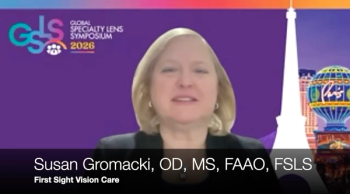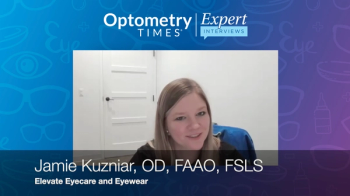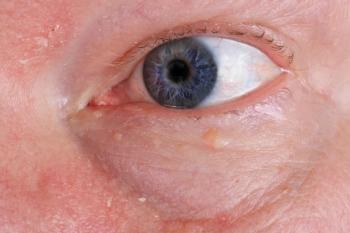
The future of optometry: Dr Katie Rachon spreads the advocacy love
Rachon, OD, FAAO, DipABO, makes the most of her optometric education through her work with residents and advocacy efforts.
For Katie Rachon, OD, FAAO, DipABO, a story from an optometrist was all it took to spark her interest in eye care. While pursuing a bachelor’s degree at Ferris State University in Grand Rapids, Michigan, and in the hunt for a health care profession, Rachon found herself shadowing an eye care professional, who shared a case where he had found a choroidal melanoma in his patient. Because this patient received an eye examination, his life was saved.
“I thought that was so cool that he could do that from a routine eye exam,” Rachon said. “I actually had never had an eye exam up until that point. So I started looking into it, and I found that there [was] a lot of stuff that optometrists could detect and treat, and there was a wide variation [in] how optometry was practiced. I was really interested in all the technology that optometry was using, and working one-on-one with people is something that I really enjoyed.”
Now Rachon has logged a residency and an extensive resume with leadership, advocacy, and volunteer experiences. She currently practices at Virginia Eye Consultants, where she manages ocular diseases and postoperative care, specializing in glaucoma, corneal disease, and dry eye.
Leadership via education
In 2014, Rachon attended Indiana University Bloomington for optometry school, from which she graduated in 2018. While in optometry school, Rachon took advantage of leadership opportunities by getting involved in the American Optometric Student Association (AOSA) and serving as a delegate on the AOSA Board of Trustees. “The people that I met there were very like-minded people [who] were champions of optometry that I am still friends with today,” Rachon said.
She also served as vice president of the Volunteer Optometric Services to Humanity chapter at Indiana University Bloomington, which provided her and the rest of the chapter with several opportunities to travel to Jamaica to deliver eye care services to underserved communities in the country. Rachon said volunteers worked to screen patients who needed cataract surgery, provided post-operative care for patients who had recently undergone surgery, distributed eyeglasses to patients, performed school screenings, and treated glaucoma. She added that professors from Indiana University performed selective laser trabeculoplasty for patients and also distributed eye drops.
“You think of Jamaica being this...island, but people would walk 3 hours to get to this eye clinic to get care,” Rachon said. “The cataracts are really bad because no one checks them there every year, or the glaucoma goes untreated, and then people have vision loss.”
She stated that having that volunteer experience as a student was particularly valuable because it served as an introduction to what patient care can mean for a community of people. “It really was inspiring to try and get involved in some way to be able to give back to the community,” Rachon said. “That’s one of my goals, probably my short-term goals, in the next few years: How can I expand on that experience that I had in optometry school?”
Residency
Rachon’s eagerness to get immersed in the optometric community during her education also led her to attend the American Academy of Optometry’s (AAOpt) annual Academy meeting during her first year of optometry school, where she soon learned that she wanted to focus on ocular disease. “[Because of] the amount that people knew and with all the disease involved with the eye, I knew that that was probably the route that I wanted to go,” Rachon said.
She took this knowledge back to school, where she took on her first externship at an ocular disease site at Bennett and Bloom Eye Centers in Louisville, Kentucky. It was here that Rachon ultimately completed a 13-month residency and trained at glaucoma, retina, cornea, cataract, and laser in situ keratomileusis clinics. “That’s how I got here and how I blossomed in the way that I did because 1) I got involved, and 2) I pursued the interest that I was looking into,” Rachon said.
She stated that she chose the residency at Bennett and Bloom because it was a high-volume site that would allow her a full scope of practice. “I was able to do minor surgical procedures and all 3 laser procedures at that site, and I was able to take that knowledge that I had to a state that did not have those privileges and use that to aid them in getting their bill passed,” Rachon said.
Advocacy
Rachon’s advocacy efforts extended into her career post graduation, as she currently serves as secretary/treasurer of the Virginia Optometric Association (VOA). She stated that advocacy not only supports the health of the optometric field, it also contributes to the health of eye care providers' individual careers. “Making people realize the importance of investing in their career––just the networking in general––is so important for optometry,” Rachon said. “I might not see pediatrics, but I better know somebody who does, and you’re not going to refer outside of your own community for that. It’s so important to stay connected, and those leadership positions that I held in school really taught me a lot of valuable lessons about how to reach out to people and inspire them to become more involved.”
VOA Immediate Past President Jacqueline Theis, OD, FAAO, also weighed in on Rachon’s contributions to advocacy endeavors, stating, “Dr Katie Rachon brings energy, courage, and a deep commitment to patient care and professional advocacy. She joined Virginia without laser privileges, stepped into leadership, and was instrumental in helping the state achieve scope expansion. She is talented, collaborative, and exactly the kind of leader our profession needs.”
Profession
Rachon said that her work at Virginia Eye Consultants remains fast-paced and varied. “One day, you’ll have a blepharoplasty post-op, followed by macular degeneration, followed by moderate-to-severe glaucoma,” she said. “Instead of doing the same thing all day, every day, it’s different every single day. I love practicing that way because then I get to use my skills to the fullest scope, and the doctors that I work with [are] really leaders in the community.”
Additionally, Rachon is involved in extern and resident education as a residency supervisor. “It’s really awesome to be able to learn right beside them, because optometry is a profession that is constantly changing,” she said, adding that working with other optometrists and ophthalmologists allows the entire team to constantly learn something new. Rachon also added that she approaches her role as residency supervisor in a way that encourages her residents to always question everything, in addition to establishing self-efficiency and problem-solving mindsets.
“The other thing important in teaching is to have a mutual level of respect,” Rachon said. “[Residents] are doctors. They earn that spot with you, and you need to treat them as such.”
Newsletter
Want more insights like this? Subscribe to Optometry Times and get clinical pearls and practice tips delivered straight to your inbox.













































